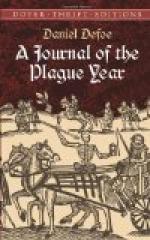But I could not at the same time carry these things to the height that others did, knowing, too, that natural causes are assigned by the astronomers for such things, and that their motions and even their revolutions are calculated, or pretended to be calculated, so that they cannot be so perfectly called the forerunners or foretellers, much less the procurers, of such events as pestilence, war, fire, and the like.
But let my thoughts and the thoughts of the philosophers be, or have been, what they will, these things had a more than ordinary influence upon the minds of the common people, and they had almost universal melancholy apprehensions of some dreadful calamity and judgement coming upon the city; and this principally from the sight of this comet, and the little alarm that was given in December by two people dying at St Giles’s, as above.
The apprehensions of the people were likewise strangely increased by the error of the times; in which, I think, the people, from what principle I cannot imagine, were more addicted to prophecies and astrological conjurations, dreams, and old wives’ tales than ever they were before or since. Whether this unhappy temper was originally raised by the follies of some people who got money by it—that is to say, by printing predictions and prognostications—I know not; but certain it is, books frighted them terribly, such as Lilly’s Almanack, Gadbury’s Astrological Predictions, Poor Robin’s Almanack, and the like; also several pretended religious books, one entitled, Come out of her, my People, lest you be Partaker of her Plagues; another called, Fair Warning; another, Britain’s Remembrancer; and many such, all, or most part of which, foretold, directly or covertly, the ruin of the city. Nay, some were so enthusiastically bold as to run about the streets with their oral predictions, pretending they were sent to preach to the city; and one in particular, who, like Jonah to Nineveh, cried in the streets, ’Yet forty days, and London shall be destroyed.’ I will not be positive whether he said yet forty days or yet a few days. Another ran about naked, except a pair of drawers about his waist, crying day and night, like a man that Josephus mentions, who cried, ‘Woe to Jerusalem!’ a little before the destruction of that city. So this poor naked creature cried, ’Oh, the great and the dreadful God!’ and said no more, but repeated those words continually, with a voice and countenance full of horror, a swift pace; and nobody could ever find him to stop or rest, or take any sustenance, at least that ever I could hear of. I met this poor creature several times in the streets, and would have spoken to him, but he would not enter into speech with me or any one else, but held on his dismal cries continually.
These things terrified the people to the last degree, and especially when two or three times, as I have mentioned already, they found one or two in the bills dead of the plague at St Giles’s.




